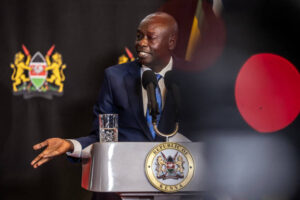
Mwau Dorothy
The ongoing protests in Kenya have led to significant disruptions across various sectors,
particularly affecting the economy, security, and the daily lives of ordinary citizens.

Major cities
such as Nairobi, Kisumu, and Mombasa have become epicenters of these demonstrations, with
citizens demanding government action on their grievances.
Economically, the protests have severely impacted businesses, with many shop owners being
forced to close their establishments to avoid damage. The fear of looting and property
destruction has paralyzed commercial activities, causing substantial financial losses for business
owners and employees alike.
Transportation services have also been disrupted, leading to significant losses for vehicle owners
and commuters. Public transport systems have been affected, with routes being blocked by
protesters, resulting in delays and increased operational costs for transport companies.
Financial institutions, including banks and other service providers, have had to close early,
creating inconvenience for customers. The frequent closures have affected banking operations,
causing delays in financial transactions and disrupting the daily economic activities of
individuals and businesses.
On the security front, there has been a rise in incidents of violence and looting, resulting in
numerous injuries and extensive property damage. Law enforcement agencies have struggled to
contain the situation due to the sheer number of protesters, leading to chaotic scenes in several
urban areas.
The police have been trying to manage the situation, but the high volume of protesters has often
overwhelmed their efforts. This has led to clashes between protesters and law enforcement
officers, further escalating the tension and violence.
Reports of excessive force used by security forces have emerged, drawing criticism from human
rights organizations and the public. The use of tear gas, rubber bullets, and physical
confrontations has heightened the tension, with many calling for more restraint and dialogue.
The protests have also disrupted the everyday lives of citizens. Many schools have closed,
leaving students without access to education. Parents are concerned about the safety and future
of their children, as the prolonged closures threaten to impact their academic progress.
Healthcare services have been affected as well, with patients and healthcare workers finding it
difficult to reach hospitals due to blocked roads. This has resulted in delayed medical care and
increased strain on the healthcare system, already burdened by other challenges.
The impact on public services has been profound, with many government offices and facilities
remaining inaccessible. This has hindered the delivery of essential services, exacerbating the
hardships faced by ordinary citizens who rely on these services for their daily needs.
In response to the growing unrest, citizens and civil society groups are calling for immediate
dialogue between the government and opposition leaders. They emphasize the need for a peaceful resolution to the conflict to restore stability and prevent further economic and social
deterioration.
Experts have warned that the ongoing unrest could have long-term effects on Kenya’s socio-
economic landscape. Prolonged instability could deter foreign investment, slow economic
growth, and exacerbate existing social inequalities, making it imperative to find a swift
resolution.
As the situation unfolds, it remains critical for both the government and protest leaders to engage
in constructive dialogue. The aim should be to address the underlying issues driving the protests
and work towards a sustainable solution that ensures peace, stability, and prosperity for all
Kenyans.





